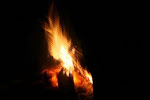 |
| print by Melanie Cervantes |
elder who has since passed. He said, “Wherever you travel in the world, it is a matter of respect and would be a great benefit to learn the ways and history indigenous to that land.” In Europe, the old ways of that land - the Celtic and Druid; in Asia, the Taoist, Buddhist and Hindu; in Africa the ancient African cosmology that preceded the missionaries; in the Americas the ways of the First Nations.
Since this is the one time of the year when the mainstream culture includes and recognizes the First Nations in our national story, I wanted to share with you another Native elder’s words on Thanksgiving.
Chief Oren R. Lyons is Faithkeeper of the Turtle Clan of the Onondaga Nation and a Native American scholar at Syracuse University. Here he shares the First Nation’s history of Thanksgiving and survival:
"Thanksgiving in America is a family day. It’s the least commercial of American holidays, and that’s good.
I can only suppose that religious peoples would celebrate Thanksgiving religiously, meaning that they would direct their gratefulness to the god of their religion, or gods, as the case may be.
As for us, the native peoples of North, Central, and South America, giving thanks is a way of life. We have ceremonies of thanksgiving for all of the Creation that take place around the lunar year.
Prior to 1492 things were quite good here in Turtle Island (North America). The streams, rivers, and lakes were teeming with fish. The woods were magnificent with old growth trees, full of free and contented animals. The Great Plains of North America were as full of animal life as the Serengeti plains of Africa. There were millions upon millions of buffalo and passenger pigeons. The deer and the antelope were playing and villages upon villages of our peoples (American Indians) sharing peace and prosperity and giving thanks on a daily basis to the Creator for the goodness and bounty of Mother Earth. Life was good. No doubt things have changed, drastically.
In 1620 a small band of religious refugees and entrepreneurs fleeing religious persecution on a small sailing vessel named the Mayflower landed at a place we now call Cape Cod. After raiding a deserted Nauset village of ten bushels of corn, oil, and a bag of beans, they settled at their next stop – a deserted village of the Wampanoag [people] called Pawtuxet and later renamed Plimoth. For the native people of the Americas, the story goes downhill from there.
Yes, it’s true that a former English slave named Samoset, an Abnaki, came with another former slave named Tisquantum, a Wampanoag, and together they saved the lives of this bedraggled group of survivors whose ranks had dwindled to nine able-bodied men. The others were too sick and/or weak from hunger to help themselves.
Yes, there was a harvest celebration in the fall of 1621 and the great leader Massasoit, with ninety members of his village, brought five deer to help launch a three-day feast. This was the first Thanksgiving for the English on our soil.
Massasoit kept the peace. It was the children of this Thanksgiving who broke faith. In 1661 Massasoit died and in 1676 his son, Metacomet, was hunted down and killed by the English in a swamp. His head was put on a pike and stayed for twenty-five years as a reminder to all native peoples that this fate awaited those who would resist the hegemony of English and Christian empire.
Today we the survivors of a great genocide continue to give thanks for what we have. It is still our way of life, and I think it’s a good idea that Americans set aside a day of thanksgiving for life and family. The freedom to give thanks is not predicated on a religious doctrine, but it is an inherent right vested in this land and our peoples who were here long before the white man."
- Chief Oren Lyons
><><><><><><><><><><
Giving thanks, or an attitude of gratitude is one of my own keys of survivorship and living the well-lived life, beyond surviving and on toward thriving. I am very grateful to be a survivor.
All the best as we reflect in gratitude,
el poquito

4 comments:
I am grateful that you give me nourishment, food for thought, with this blog. I open each new post with high anticipation and I am never disappointed. So, on this holiday, I am giving thanks to you, el poquito.
I give thanks for meeting eloquent fellow travelers.
Standish also unearthed a few graves while stealing the corn. Vacationed in Cape Cod for a few years in a cabin near the bay. The beach was called "First Encounter." Title of my next novel.
Hi All, thanks for stopping by the holiday table.
Recovered??? Forward! On to the next. Snowing here in the north country. It's definitely winter. Vacation on Cape cod beach sounds lovely. Those easterners with their 'First Encounter' though.... Will they ever get it - they weren't the 'first'?? Oh well, guess what really matters is where we go from here with our "Further Encounters."
Best to you all,
el p
Post a Comment